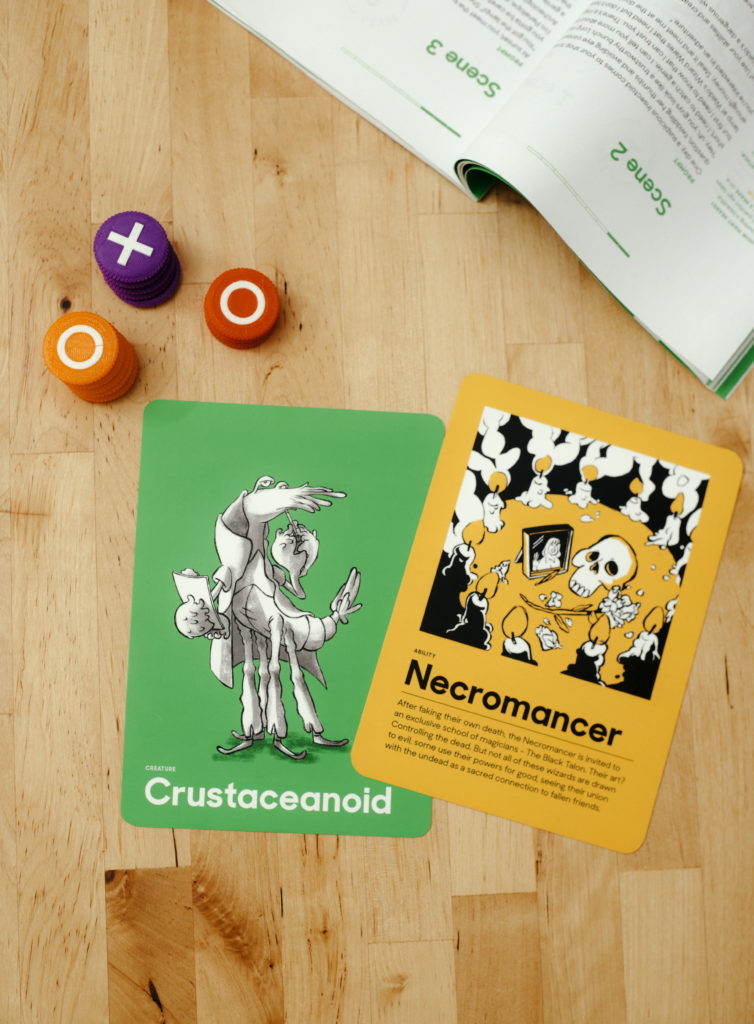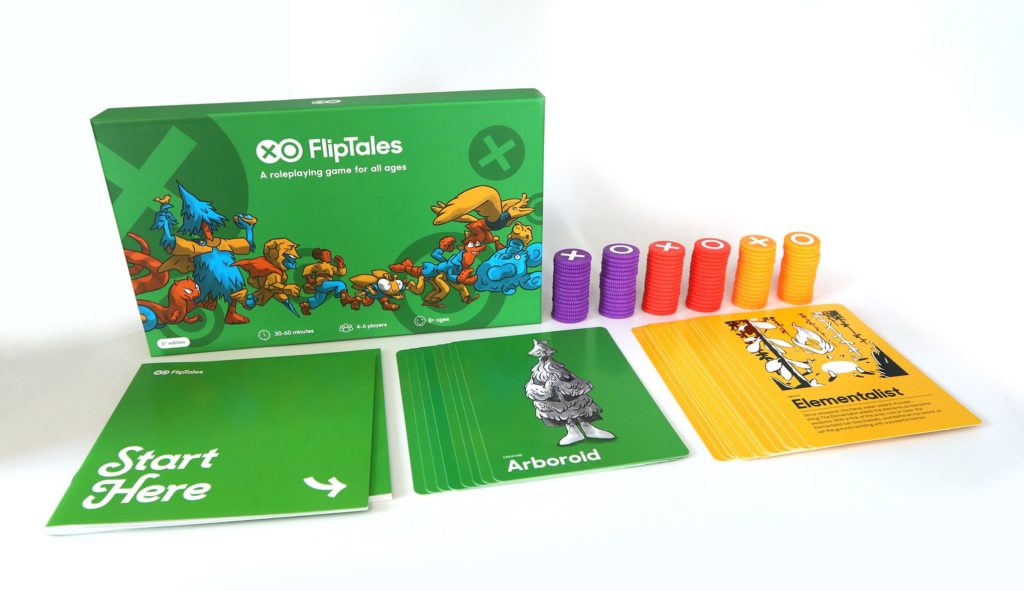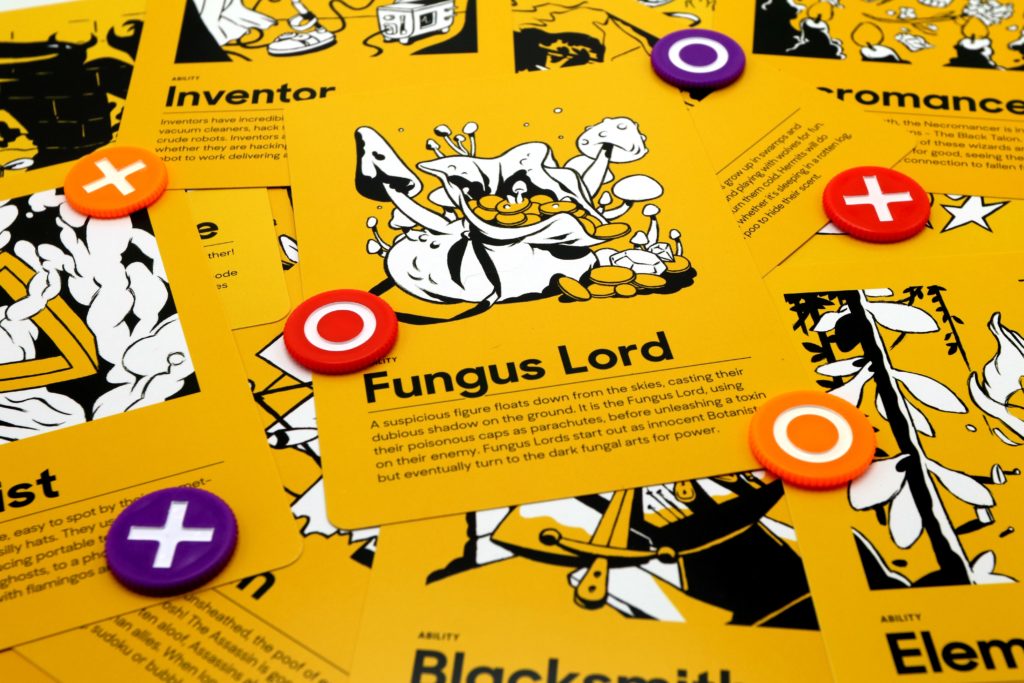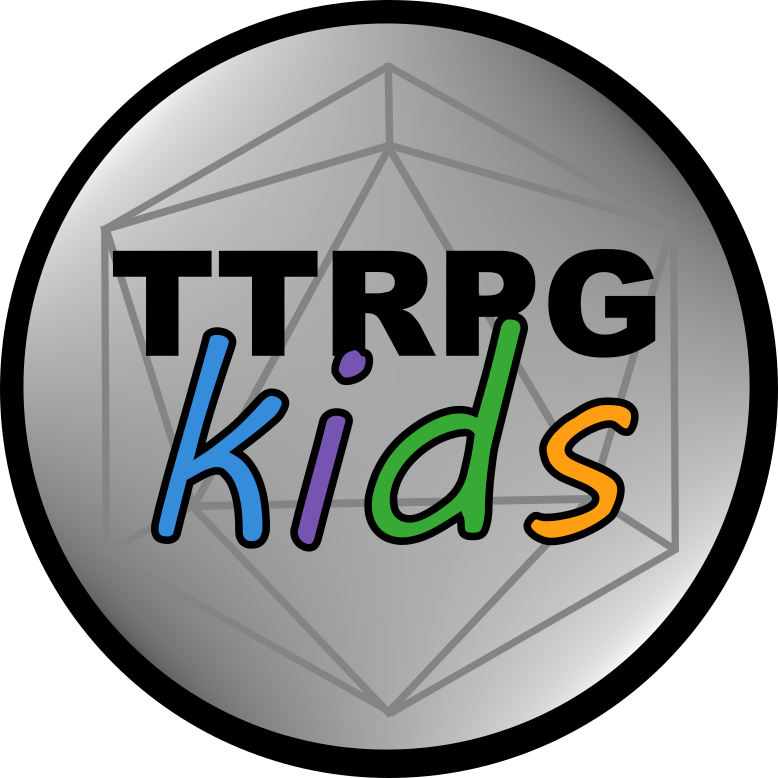Interview with Ryan, creator of FlipTales
Note: this is a transcripted interview, edited for ease of reading
Jump to:
- About Ryan
- First experience with tabletop RPGs
- How FlipTales started
- The process of making FlipTales
- Characters in FlipTales
- Designing FlipTales
- All ages accessibility
- Advice for other game creators
- Advice for those starting tabletop RPGs
- The growing future of tabletop RPGs
- Submit your ideas for FlipTales!
About Ryan
I’m an interaction designer at Google, so I spend most of my day doing UX design and prototyping.
I actually have a background in designing toys. At Little Bits, I was designing toys for a couple years, and I am also interested in early childhood education.
I’ve been doing a lot of experiments lately with AI. Mostly I just post my experiments on twitter. The one I did recently, I asked an AI to come up with some silly examples of weapons for D&D, and I illustrated them. Dire Flail of the Dragon Follower, Staff of the Flying Forcefield, these are actually pretty tame. They’re not super crazy. I could probably get it to produce some sillier ideas.
First experience with tabletop RPGs:
In highschool, I started playing dungeons and dragons because of my neighbor, Matthew Clinkle. He was one of those really sadistic punishing dungeon masters. I remember looking in the player’s manual for things that I could buy with my starting gold, and I got this donkey. I was really excited about this donkey.
I left it by a tree when we went into this cave, and when we came out, the donkey was gone. My DM was like, “Shouldn’t have just left it there! Dangerous out there, a bunch of goblins probably stole him. Be careful next time.”
I was crushed internally, but it really gave me this sense of immersion. My decisions all mattered. You know, in video games, that would never happen. At least, most video games, it wouldn’t have happened, so I really loved that feeling of it being like a video game, and having magic powers but with the deep complexity and choices of real life.
I fell in love with it, and that was my initial interest in role playing games.
How FlipTales started:
I started making my own role playing game in high school because all games involving dice were banned across the whole state, so I needed to come up with something that didn’t use dice. I started experimenting with different kinds of resolution mechanics. Originally, it was just about replacing dice.
Through play testing, players really liked the simplified rules that I had come up with and the different playable creatures and abilities. That ended up being the new soul of the game. I decided to make it a real thing and released it on kickstarter in 2018.
The process of making FlipTales:
Years of playtesting:
I think I wrote on the back of the instruction manual, but I think it was nine years? Ten years? From when I started to when I released it. Now, a lot of that was not touching it, so if you condensed it to a part time job, it was probably three or four years of part time labor.
I really wanted to take my time on it. Part of my journey on FlipTales was that I was a pretty low level employee at Little Bits and feeling frustrated with working on large teams for the first time and having to meet deadlines and budgets. I really wanted to give myself time to get it right.
Illustration revisions:
I gotta give a ton of credit to Caroline Brewer, who is the illustrator on this project. They were super patient with me on revision. I tried my best to not be the client from hell and ask for tiny little changes like, can you change it into a muffin instead of a cupcake? And yadda yadda yadda.
I did request a couple significant changes. In the ability cards, there was a pretty significant round of iterations where we basically redid four or five of the illustrations. I found in play testing that people were not picking four or five of them; a lot of the time, people were picking just based on illustration. It seemed really impactful to have an awesome illustration.
Also, before there was Wingoid, the eighth creature was Octapoid, so an octopus creature. I thought it was unfortunate to have two aquatic creatures; there was Crustatiod and Octopoid.

The way I generated the creatures initially was I made this weird binary tree where there were vertebrates and invertebrates, nomads and settlers, and it ended up generating two underwater creatures, which were too similar. So, I broke the rules a little bit and replaced the octopus with a vertebrate, and that also came pretty late. I felt really bad asking for another illustration because we had already done the illustration for the octopus, but I think it was the right call, and a lot of people pick Wingoids. Glad I went with it.
Do it right, for yourself:
I probably could have done it faster, but I really wanted to take my time. I definitely think you wouldn’t always take your time to do it this way, but I really wanted to prove to myself that I could make something I really liked if I took my time on it. Tthat’s the approach I took.
Characters in FlipTales:
Developing character mechanics:
I think that the main focus of FlipTales is accessibility. I wanted to make it really simple to make a character, ideally, in 5 minutes or less.
First, I went through the [D&D] character sheet and just removed a bunch of stats. I playtested that, and people were like, man… still complicated.
I was like really? I deleted half the stuff! There’s only 4 base stats, 7 skills… But newcomers still thought it was really complicated.
So, I simplified further and further and further until I realized… Why do I need this character sheet at all if the fundamental choice that I want people to make is picking a creature and picking an ability?
I ended up making them cards instead. That way people can just pick one, pick another one, and they’re basically done making their character.
Now, of course, it’s not the same experience as Dungeons and Dragons. Picking a name and a god, if that’s your jam, creates a personalization and investment which is really special, but my main goal here is about accessibility.
I had a goal where I wanted people who had never played a role playing game to be able to learn how to play the game and play a full game in 30 minutes to an hour. Obviously, you can’t spend 3 hours making a character and hit that goal.
Character options:
One of the main gripes I had with D&D was that I always ended up picking the same thing every time I played. Why are there only 5 options? 6 options? Of course, there’s a ton of homebrew content out there, but I had this idea of having more wildly different playable creatures.

I also felt that there was some racial elements… the classic dungeons and dragons races seemed to align with stereotyped human races, which I had a big problem with. I still love this idea of playing a dragon-like being or creature, but I wanted to bring it further away from just slightly different looking humans where some are stupid and some are smart… I didn’t like that. Well.. what if you’re playing a single celled organism? Or a tree? So these are wildly different.
Ability options:
There’s 16 different abilities; I tried to make sure that ideally there are at least 2 that are appealing to anyone who plays.
Also, because the games are so short and character creation is so fast, it should feel low stakes, so the players don’t feel…. Like, part of the reason I picked the same thing every time with D&D every time was this is a really long commitment. I’m going to be spending months playing this character, so I better really like it.
Since this is mostly focused on one shots and 5 minutes to set up a character, it’s less commitment to try out one that normally you don’t play, like blacksmith. I might not normally play blacksmith, but it’s an option, and it only takes an hour to play through.
Designing FlipTales:
Familiar 5×7 cards:
I also went to school for industrial design, so I’m very concerned with the form of things. I fell in love with the idea of these small 5×7 cards. You have two of them, and that’s your character.
A lot of the design was just working backwards from that size card. The game had to be simple enough to fit on that card. I was obsessed with the idea of holding these two cards and having everything I needed.
The 5×7 inch card was a lot inspired by childhood learning materials. If you’re ever learning the alphabet or word problems, sometimes the information is just given to you on these small, hand sized cards.
Parsing down FlipTales:
Being a toy designer, I worked a lot on instruction manuals, so I did a bunch of user testing. I got to see how people confront complicated things for the first time. I just had a very realistic and pragmatic approach to complexity.
I think that it’s so crazy the amount of times I removed content from FlipTales. At first, from D&D, I cut out half the things on the character sheet, and everyone’s like, “It’s still complicated”…and I was like, really?
Even when I got it down to a creature card and an ability card, people still said it was too complicated, so I whittled it down from 8 abilities to 4.
Then people STILL said it was complicated, so I went down from 4 levels to 3, and when I went from 4 levels to 3, that was the magic point. People stopped complaining about it being too complicated. I don’t know why, but something about the information density on the cards going from 4 to 3, I finally crossed that line.
I eventually caved, which was really hard because I had to delete all this content. That was the difficult yet necessary thing to do for this project.
It was so hard to keep going because when your starting point is Dungeons and Dragons, getting to FlipTales is maybe three orders of magnitude, three big steps of simplification.
It took a lot of imagination and patience to be willing to cut that much. It was really hard, and it is an interesting challenge for any role playing game creator – which of the things that I learned as a norm from D&D and other games like it are necessary? and which are not?
For example, having a dungeon master. It isn’t really necessary, but it feels necessary if you’ve only ever played dungeons and dragons.
Creating a vibe:
Another inspiration for FlipTales was specifically the chain devil from dungeons and dragons. I remember seeing the chain devil in the monster manual and being terrified and viscerally repelled and wanting to leave the room. I remember feeling uncomfortable in my body during the session that we confronted with a chain devil.
I think that because of the counterculture metal origins of D&D, there is a lot of this content, which is pretty graphic and violent. I think that can be off-putting to very young children… Actually, I haven’t observed that in children, but it was off-putting to me… and it may be off-putting to parents. Maybe the children enjoy it, but the parents don’t enjoy it.
I try to shoot for a Disney/Miyazaki tone for the content so I feel confident that all ages will feel comfortable entering this.
Artistic style:
Also, with the art, I was really intentional in trying to pick a style for the art which was kind of hard to place. That’s why the illustrations are black and white. I want people to bring their own imaginations about how things would come to life.
I tried to avoid the Wizards of the Coast aesthetic because I think it can be a little bit alienating for some people who don’t consider themselves nerds. I’m totally a nerd and I love all that stuff, but… I also know that it could be a little embarrassing to bring something like that to a friend group and be like, “hey, does everyone want to geek out with me on this?”

I’m hoping that FlipTales is enough of a Disney vibe that it’s easy and feels the same as Jackbox. It’s very un-intimidating to get a group of friends around a game of Jackbox.
I think that with the art, the overall tone and the voice is a big way I’ve tried to appeal to that broader audience.
All ages accessibility:
About the ages, I didn’t originally set out to make FlipTales for a specific age group. I just set out to make something with my friends that I really wanted to play. Since I was so interested in accessibility, that just happened to, for free, make it accessible for all ages.
As I played the game with a whole bunch of people, that was a thing people would comment on – oh! I’ve been trying to get my kids into D&D, or… my spouse, or my uncle.
Grandma approved:
I had one particular play testing session where I played with my grandma. She majored in botany in college, and she picked the Arboroid, which is like a tree person. She had all these very interesting role playing ideas for how to play an arboroid.
It totally shocked me because my grandma is a pretty typical grandma, and I wouldn’t easily picture her playing Dungeons and Dragons. I think she could play D&D because she’s super smart and analytical, but maybe it was easier for me to feel comfortable asking her to learn.
I was like, oh, wow, I can play this with my grandma, and I can play this with kids, and it felt unique.
Designing games for children:
When I looked at other options around for role playing and kids, I felt like they were a little bit talking down to kids or like dumbing it down and speaking in overly child-like language, which bothered me.
I visited a bunch of kindergartens in China that run this really cool play based curriculum. This one in China, called Angiplay, has the most radical approach where teachers are seen as coaches and not as centers of knowledge.
I’m really interested in seeing children as the experts of their own experience and their own knowledge and never talking down to them. In a lot of ways, children are a lot better at imagination than adults.
Children can simultaneously hold conflicting ideas, more easily than adults. Adults really struggle when more than one thing can be true at the same time… they’re like no, there has to be one simple answer!
Advice for other game creators:
I think the main advice I would give is that… game design is a lot simpler than people make it out to be.
When I was developing FlipTales, I was always nervous. I would do a play test, and I would feel like, I don’t know… was that playtest good? I don’t know… we did all the things that I wanted to do, but how do I know if it’s a good game?
I think that after having gone through a ton of testing with FlipTales, it really is as simple as: are people having fun?
And if people are not having fun: where can you remove roadblocks that are causing them to not have fun? Where can you simplify? Where can you add complexity if people are really enjoying the complexity that is there?
I think that my advice to other creators is to focus as much as you can on getting something in front of people, watching them play, and doing those blind playtests where you don’t tell them anything.
Another thing that was super liberating for me was realizing that even if people played the game differently from how I imagined, they still had fun. If they’re still having fun, it doesn’t matter if they’re playing the game a little differently. That allowed me to simplify the game a lot.
I would just advise people to focus on getting the game in front of people and trying to see where people are having fun, and it’s really just as simple as that.
Advice for people who are unsure about starting to play tabletop RPGs:
For children:
If the new person is a child, don’t worry at all. In my experience, children are way better at handling role playing games than adults, for FlipTales in particular.
Dungeons and Dragons… there’s so many things on that character sheet to fill out, and you have to convince them that they all matter. The truth is that they don’t all matter, so you will fail to convince them that it all matters. That could result in friction depending on how important rules-following is in the dynamic of the group.
For everyone:
Sometimes it’s easier to sell people on the mission and the story vs. the actual system. I think it’s tempting to be like, hey, do you want to play D&D? Or play FlipTales? I feel like if you’re already in it, that’s your mental model. These are the systems and they do different things.
What I’ve seen to get people to fall in love with it and play the first time is like, hey! Do you want to play this game? You get to go on adventures and there’s this one where you get to help this person find a date, and there’s this one where you go searching for a genie… and that might be more interesting to someone than the abstract idea of role playing games in general.
It’s tricky for me, because I always was like hey, I have this new game that I’m working on, and I want to playtest, are you down to playtest? And I think that’s easy to say yes to because people want to help you. It feels kind of cool to be involved in this exclusive thing.
So, one idea is that people make their own content and say, hey, I made this cool mission, and do you want to play test it? People will be more likely to help out and playtest it.
The growing future of tabletop RPGs:
I also think that it’s easy to feel right now like D&D has blown up, but I feel like actually it’s still early days. We’re still only talking to maybe a larger nerd culture… it used to be a small sub culture of nerd culture, but now there’s good potential for this to go bigger than all the nerds.
Not to say that if you play D&D, you’re a nerd, but I’m just saying that I think we’re still in the early days of how accessible role playing games can be. If you think about it, everyone plays pretend as children, and as we grow up, we stop playing pretend. I certainly think that it’s great for everybody to do this.
The educational benefits for this are massive. It’s totally correlated with what people call 21st century skills: creativity, problem solving… all of this kind of stuff is going to be more and more important as the economy shifts away from manufacturing and towards technology and services.
Submit your ideas for FlipTales:
I would like to plug FlipTales and say that I am always looking for people to submit custom stories that they make. It actually is super easy to do, and I will definitely playtest anything that people submit on the website. I’ll publish it as long as it meets that previously mentioned family-friendly bar.
Thank you!
If you liked this post, make sure to subscribe to the TTRPGkids monthly newsletter to stay up to date on the latest reviews, tips and tricks, game and podcast list updates, and more! Thank you for playing tabletop RPGs with your kids and sharing this awesome hobby with the next generation!



Wow. What a rich and thorough interview. Where do you meet all these amazing creators?
The interviews have been a really fun part of doing the blog. I met almost all of them through twitter, but I’ve slowly been branching out. There are so many cool creators and TTRPG parents out there!